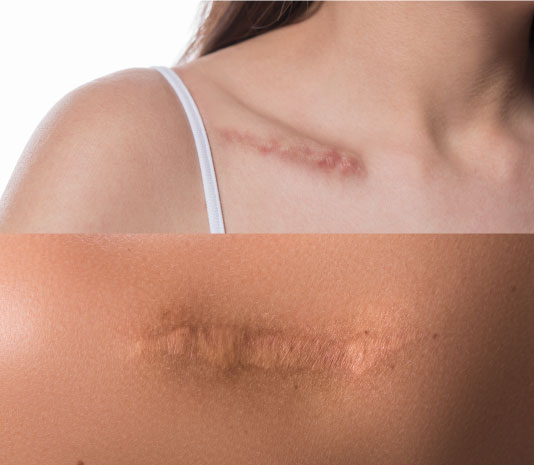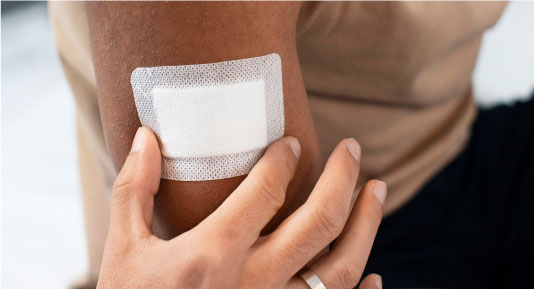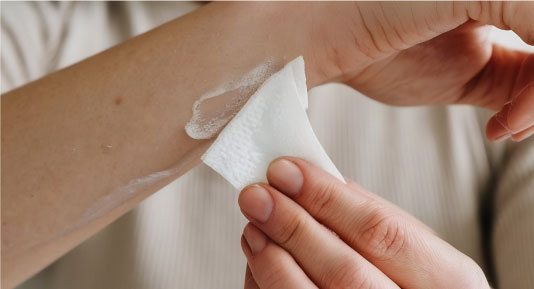
What can I do to look after my scars?
Although the care will depend on the type of wound (acne, stretch marks, accidents or surgery), there are some general recommendations that are very useful to prevent wounds from healing badly and ending up as permanent, visible scars.
In the case of surgery, avoid smoking a month before and after the operation, since it limits the amount of available oxygen in the blood, which hinders healing.
Carry out the following essentials in the first month:
- Wash the wound gently with neutral soap and water.
- Dry the wound with a hairdryer using cold air or a towel by gently dabbing the area, without rubbing it.
- Apply some antiseptic to the wound to avoid any possible infection.
- Protect the wound with gauzes to prevent any chafing.
- Avoid stretching your skin, as this will also stretch the wound and can even pull out the stitches.
- Wash the wound gently with neutral soap and water.
Use sun cream: protect your wound with high protection factor sun cream, even in winter.
Hydrate: both before and after we get a scar, we should always try to keep the area well hydrated in order to favour its elasticity.
A diet rich in vitamins and trace elements: increase your intake of fruit, vegetables, nuts, dried fruit and seeds as this will help improve healing. This is because vitamins C, A and E appear to have a positive influence on skin repair processes. Furthermore, a shortage of trace elements such as zinc, manganese and copper inhibits the proliferation of epithelial cells and delays tissue growth. These minerals can be found in shellfish, whole grains, pulses and nuts.
Extra help: if the scar does not completely disappear over time, or if it has left a raised area (hypertrophic scar or keloid), or it is a contrastingly different colour, there are different types of laser treatment to even it out.
How to look after a scar after having the stitches out
Continuous hydration: using moisturising products, usually oils, such as rosehip oil, to massage in to the scar. This improves lymphatic draining, thereby avoiding inflammation of the tissue. Pure rosehip oil contributes to regenerating tissue if it is used continuously. There are also products that contain anti-inflammatory substances and inhibitors of certain molecules that can be found in anomalous scarring.
Special dressings for scars: which usually contain silicone polymers to help reduce the size of the scar and improve the elasticity of the skin. They prevent hypertrophic scars from forming. They are very useful for treating burns and scars on children. They also alleviate itching. They include a physical sun cream SPF 50. There are different sizes and they can also be cut to size. We do need to take care though, because continuous use can irritate the area.
Silicone gel: this gel speeds healing. It evens out scars and improves their elasticity, whilst also keeping them hydrated. It should be applied twice a day over at least 3 months.
Healing creams and ointments: such as vitamins A and E, centella asiatica (Indian Pennywort), zinc or rosehip. In general, they should be applied by gently massaging them in, two or three times a day for at least 2 months. Creams and ointments that include a high sun protection factor are ideal. The gel-like texture is very useful to treat acne scars since it does not contain any oil.


How to look after wounds in the sun
Our skin is particularly sensitive to ultraviolet radiation after a healing or scarring process. Therefore, exposing it to the sun without the right protection can lead to hyperpigmentation of the area, which makes it darker than the surrounding skin.
No sunbathing. The scar area should be covered with physical barriers and sun cream to a factor of around 50. The cream should be frequently reapplied and should be used in summer and winter.
We should avoid exposing it to the sun, protecting the scar from the beginning until it acquires the same pigmentation colour as the surrounding skin. This process can last up to around a year.
How to keep a wound hydrated
When a wound has closed, we need to make sure we keep the skin hydrated to ensure it is sufficiently elastic to easily regenerate.
Although rosehip and argan oils are good enough to heal normal wounds, there are specific products to help heal more problematic wounds, through stronger emolliating and moisturising actions. It is a good idea to consult an expert dermatologist who will recommend the best treatment for each type of scar or wound.








